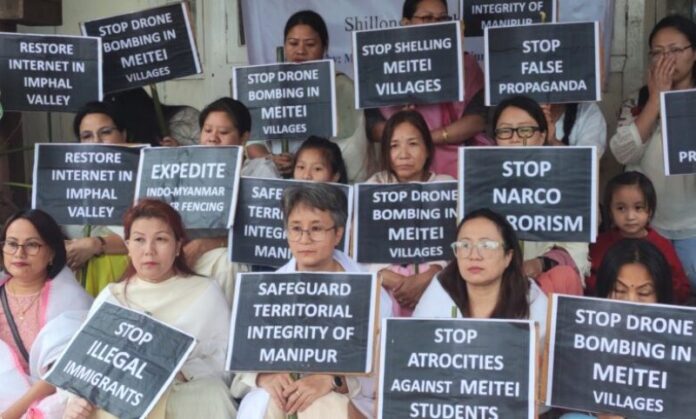In a major show of solidarity, Meiti groups have staged protests in both Meghalaya and New Delhi, drawing national attention to the escalating violence in Manipur. The demonstrations come in the wake of worsening unrest in the northeastern state, where ethnic tensions have intensified, leading to widespread suffering and disruptions.
Background of the Manipur Crisis
Manipur, a state in India’s northeastern region, has been grappling with severe ethnic conflict and violence. The situation has been exacerbated by long-standing ethnic tensions between the Meitei community and other groups, including the Kuki-Zo community. The violence has led to numerous casualties, displacement of families, and major disruptions to daily life. The conflict has drawn national and international concern, prompting calls for immediate intervention and resolution.
Protests by Meiti Groups
The Meiti groups, representing the Meitei community, have taken their grievances to the streets of Meghalaya and New Delhi to voice their concerns about the escalating violence in Manipur. The protests are characterized by large gatherings, public demonstrations, and demands for urgent action from the central government. The protesters are calling for:
- Immediate Ceasefire: The Meiti groups are demanding an immediate halt to the violence and a return to peace in Manipur. They seek a ceasefire agreement between the conflicting parties to prevent further bloodshed and ensure the safety of civilians.
- Government Intervention: The protesters are urging the central government to intervene decisively to address the underlying issues causing the violence. They are calling for increased security measures, effective law enforcement, and diplomatic efforts to resolve the conflict.
- Humanitarian Assistance: The Meiti groups are also advocating for increased humanitarian aid for those affected by the violence. They emphasize the need for relief efforts to assist displaced families, provide medical care, and restore basic services in the conflict-affected areas.
Impact on Meghalaya and New Delhi
The protests in Meghalaya and New Delhi have had a substantial impact on local and national dynamics:
- Increased Awareness: The demonstrations have brought national attention to the crisis in Manipur. Media coverage and public discourse have heightened awareness of the conflict, generating pressure on policymakers to take action.
- Disruptions: The protests have caused disruptions in both Meghalaya and New Delhi, including traffic blockades and public rallies. These disruptions underscore the intensity of the protesters’ demands and the urgency of addressing the Manipur crisis.
- Political Implications: The protests have political implications, influencing public opinion and potentially affecting upcoming elections. The central government’s response to the crisis will be closely scrutinized, and political leaders may face increased scrutiny and pressure.
In response to the protests and the ongoing violence, the Indian government has taken several steps:
- Increased Security: The central government has deployed additional security forces to Manipur to stabilize the situation and prevent further violence. Efforts are being made to restore law and order in the conflict zones.
- Diplomatic Efforts: The government is engaged in diplomatic efforts to mediate between the conflicting parties and seek a peaceful resolution. Talks and negotiations are ongoing to address the underlying issues and facilitate dialogue.
- Humanitarian Assistance: The central government has initiated humanitarian relief efforts to provide aid to those affected by the violence. Relief packages, medical assistance, and support for displaced families are being prioritized.
The protests staged by Meiti groups in Meghalaya and New Delhi highlight the urgent need for a resolution to the escalating violence in Manipur. As the conflict continues to impact lives and disrupt communities, the demands for immediate action, government intervention, and humanitarian assistance grow stronger. The situation remains fluid, and the response from both the central government and the broader public will play a crucial role in shaping the future of Manipur and its path to peace and stability.




